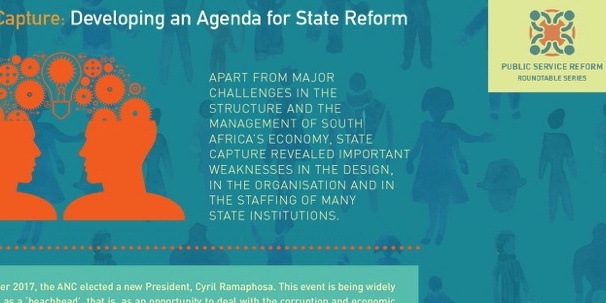State Capture and its Aftermath: Developing an Agenda for State Reform
A programme to build a responsive, working state
Press Release
Apart from major challenges in the structure and the management of South Africa’s economy, state capture revealed important weaknesses in the design, organization and staffing of many state institutions. The Public Affairs Research Institute (PARI), working in partnership with a broader civil society, has launched a major programme on reconstructing the public service in South Africa, in the aftermath of state capture.
Disturbing revelations of ‘state capture’ have brought to the surface the need to re-prioritise state reform and address a number of issues that this entails, such as: maintaining the political and administrative divide in the public service; how government officials are recruited and appointed; the relationship between party and state and political deployments; how leaders of key state institutions, including state-owned enterprises, are appointed and promoted, how public procurement is conducted and monitored, as well as political party funding. In view of an electoral system that is political-party driven, political parties are pivotal players in state reform.
Reforming the ‘state’, however, should not be limited to a focus on the executive as a key site of decision-making power. It must also encompass the public service – the bureaucracy that interfaces with the public and gives meaning to the notion of a responsive state as it assists, at an operational level, to deliver services to the most vulnerable sectors of society.
As much as a key focus on state and institutional reform (which includes the public service) is warranted, a responsive state will only be partially accomplished if it is predominantly based on changes in policies, legal frameworks, and internal controls and mechanisms to enhance accountability and transparency. Responsiveness necessitates an active citizenry that keeps power in check – from the outside looking in – a constant presence that demands state accountability through on-going monitoring.
There needs to be a return, at the very least, to the notion of public participation as encompassed in the Constitution. In a number of cases, the courts have aimed to set the minimum parameters for meaningful public consultation and participation. The timing to build on public participation is opportune, given that over the last 18 months, there has been a growing momentum in South Africa, where PARI and the media have played central roles in exposing levels of state corruption/fraud and maladministration.
Drawing on the lessons of 2017 of the power and the importance of civil-society in South Africa to defend and drive democracy, there is a historic opportunity for a civil-society led initiative to reform government, professionalise public administration and to build a capable state.
The #AfterCapture campaign has four components:
- Build momentum and support for state reform
In-depth consultations on key issues of state reform will be conducted as a build-up to the conference to identify and involve civil society organisations to host parallel sessions at the upcoming conference. These consultations will provide PARI with a rough footprint of government and civil society initiatives on institutional reform and ideas on how to prevent state capture from reoccurring. These consultations will take the form of one-on-one discussions and cross-sectoral engagements (NGOs, government, political parties, unions) or thematic engagements.
- Host a conference to develop proposals on key areas of intervention and comparative ‘best-practice’ from the global South
The aim of the conference, to be attended by both national and international thought leaders on state reform, is to provide for knowledge exchange, sharing of comparative experiences on institutional reform and to identify evidence-based proposals to take forward based on identified conference themes. The conference will also serve to identify members of technical commissions to deepen such proposals after the conference.
Date: Monday 22 October to Wednesday 24 October 2018
- Establish technical commissions to influence political party agendas
Flowing from the conference, technical commissions will be established to deepen thematic proposals, develop specific recommendations on state reform and identify key drivers to take such recommendations forward.
- Influence political parties to adopt proposals for state transformation
Relying on the state reform proposals developed through the technical commissions, engage political parties to adopt and/or support such proposals and their implementation. The aim is to work with political parties to incorporate such proposals into their manifestos and election platforms.
Details on the #AfterCapture campaign HERE.
To be added to the #AfterCapture mailing list, please contact
Baaitse Nethonondo, Programme Coordinator, baaitsen@pari.org.za
For information on the campaign, please contact
Florencia Belvedere, Programme Consultant, florenciab@pari.org.za
For interviews or media access, please contact
Vishanthi Arumugam, Communications, Communications@pari.org.za, 0828906365
To contact Public Affairs Research Institute
Mpho Mohapi, Administration, info@pari.org.za, 011 482 1739
END.


